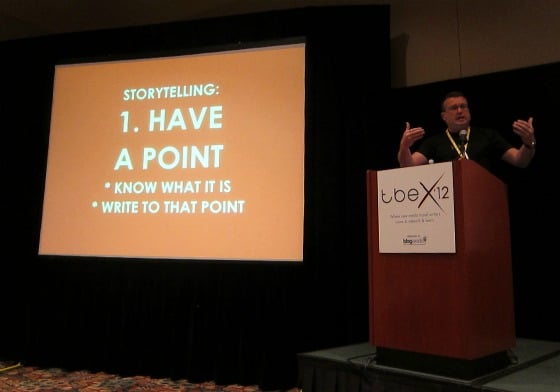“If you just want to write about yourself, it’s not travel writing,” said Spud Hilton, editor of the San Francisco Chronicle travel section. “It’s called a memoir.”
Spud was speaking with Stephanie Yoder of the travel blog Twenty Something Travel at the Travel Blogger’s Exchange conference, popularly known as TBEX, in Colorado, June 2012. Together, they were presenting the one and only travel writing seminar at TBEX, 10 Steps to Writing that Better Engages and Keeps Your Readers.
I had the pleasure of introducing the seminar, and I said that I thought it was the most important one on the agenda; and that without a story, you’ve got nothing. Like Spud and Stephanie, I feel strongly that quality writing is important, and that learning to tell a story is essential to being a travel writer / blogger.
What is quality travel writing / blogging? They started the seminar with this definition:
- it meets the informational or emotional needs of the reader
- it entertains, informs or inspires the reader
- it satisfies the writer
Spud made a passionate plea to the audience to get them to rethink travel blogging: “You don’t want to just get readers, you want to keep them,” he said. ”They will get bored of you a lot faster than of the places you go. And remember that you grossly overestimate your ability to write about a place. When you were there, you experienced it with all five senses. But your readers don’t have that experience; they are using only one sense. You have to convey it.”
Travel writing and the art of the story: Have a Point!
Spud and Stephanie then went on to present their Top 10 travel writing tips — but to me, tip #1 seems to be the most important.
- Have a point. Without a point (or premise) you are re-hashing your diary, Spud said. You need to make a bigger point than simply you were there. He gave the example of traveling in wine country and then writing a piece about what ELSE you can do there, aside from wine related activities.
- Prose is the frosting. The story is the cake. (See tip #1.) There’s no point in describing a setting if you don’t have a point.
- Understand structure. At the very least, you can use the standard five-section “essay” format: Lead, premise (aka nut or nut graph), scene 1, scene 2, scene 3, walk-off.
- Be unique or original. You are not the first person to go up the Eiffel Tower or even swim with sea lions in the Galapagos. You need to put a fresh spin on your travel experiences to make your writing fresh and engaging.
- Organize content in a digestible way. Break up text, add headings, use lists. Be succinct or be engaging.
- Cultivate a unique voice and personality. Travel bloggers, in particular, need to do this to stand out. It has been said many time, though perhaps especially by Gary Arndt, people follow personalities online.
- Be creative with context. In other words, if you want to express something like a measurement, use a compelling image or example. For example, instead of saying x cubic whatevers of water, say it was more than the combined flow of all the rivers of the world. To get creative measurements, type the measure into Google and “you will get something weird,” said Spud.
- Proofread your work. You cannot come off as a professional writer if your copy is full of typos and grammatical mistakes. Stephanie suggests reading your work aloud and having a second set of eyes look at it.
- Grab attention immediately! You need to grab the reader in seconds. The first paragraph is the most important. Give them a reason to care.
- Fact-check your work. “I cannot emphasize this enough,” said Spud. “If your mother says she loves you, check it out.” And don’t trust Wikipedia or the tourism industry. Check the facts you are given. You might not have to go to the lengths in this video below, but check everything out.
Finally, Stephanie and Spud’s plea for …
- using “fewer” not “less,” if a specific number is involved
- being accurate instead of using attribution (the word allegedly doesn’t protect anybody from anything)
- reading William Zinsser “On Writing Well” and Strunk and White’s “Elements of Style”
- not using a quote for a lead
- using dialogue only if it advances the story (and be accurate, don’t make it up!)
- understanding that good writing is important to blog readers
- writing to intrigue people rather than writing for SEO
- editing: you need an editor (try creating a partnership or circle of writers and editing each other’s work).

Mariellen Ward is a freelance travel writer whose personal style is informed by a background in journalism, a dedication to yoga and a passion for sharing the beauty of India’s culture and wisdom with the world. She has traveled for about a year altogether in India and publishes an India travel blog, Breathedreamgo.com. Mariellen also writes for magazines and newspapers.









